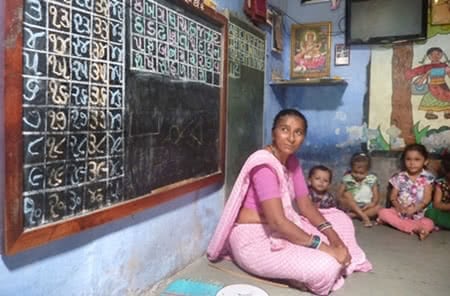Child care workers provide a necessary and valuable service that benefits individual families and the community and state. But care workers—almost always women—are often parents themselves. For these women, the rigours of their paid care work can conflict with their care responsibilities at home.

Parents need someone they can trust to look after their young children while they earn an income. Quality public child care is especially vital to ensuring women—who bear most of the responsibility for caring for children—can work. This presents particular challenges for parents who work in the informal economy, where earnings tend to be low.
According to UN Women (2015), which looked at 31 countries in the global South, less than 1 per cent of women living in poverty have access to child care services. Governments do not invest enough in providing quality public child care services that reach informal workers and their children.
Child care workers provide a necessary and valuable service that benefits not just individual families but the community and the state. However, in many societies this work is devalued as “women’s work”—an extension of women’s care duties at home. It is typically poorly paid, informal and offers no social protection benefits.
Child care workers—almost always women—are often parents themselves. For these women, the rigours of their paid care work can conflict with their care responsibilities at home.
Meet Care Workers
These profiles and case studies offer insight into public and worker-managed child care centres and the women who work in child care in India and Thailand:
- Balsevikas: Serving Children, Families and Informal Workers
- The Balsewa Benefits: SEWA’s Innovative Child Care Centres and Workers
- A Crucial Service: Three Child Care Centres in Bangkok
The lack of public child care services can lead families to hire domestic workers to care for their young children at home. Therefore, domestic workers are another group whose paid work often involves child care—and whose days can be a constant struggle of juggling paid and home care duties, as explained in these worker profiles from India:
Learn More about Child Care Cooperatives
The Self Employed Women's Association (SEWA) has, for three decades, offered its members ─ informal women workers ─ child care services through its Balsewas. A WIEGO Blog featured a conversation with SEWA's Mirai Chatterjee on this holistic model and approach. Read the blog.
Cooperatives run by workers for workers in the informal economy offer solutions in meeting women workers’ care needs, while also protecting the labour rights of care workers. The joint ILO/WIEGO report Cooperatives Meeting Informal Economy Workers’ Child Care Needs (2018) examines three different models—in India, Brazil and Guatemala—and explores the challenges and opportunities. The report also recommends the next steps in expanding cooperative provision of child care to informal workers, supported by greater public spending on child care services.
Health Care Cooperatives
Like child care, health care is an obvious and crucial need for the world's informal workers, who often lack access to their country's formal ─ and expensive ─ medical systems.
Across India, SEWA’s health cooperative, Lok Swasthya SEWA Mandali, has established innovative Shakti Kendras (empowerment centres) that deliver invaluable benefits. In addition to providing preventative health information, community health workers spend their long days helping SEWA members connect to government programmes and access the health benefits to which they are entitled.
This Workers’ Lives essay, Bridges to Better Lives, offers an intimate look at the community health workers of the Shakti Kendras, the wide range of services they provide in a challenging policy environment ─ and what they gain in return.
